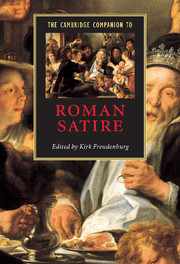Book contents
- Frontmatter
- Introduction
- Part I Satire as literature
- Part II Satire as social discourse
- 10 Satire as aristocratic play
- 11 Satire in a ritual context
- 12 Satire and the poet
- 13 The libidinal rhetoric of satire
- Part III Beyond Rome
- Conclusion
- Key dates for the study of Roman satire
- Bibliography
- Index
- Series list
13 - The libidinal rhetoric of satire
from Part II - Satire as social discourse
Published online by Cambridge University Press: 28 May 2006
- Frontmatter
- Introduction
- Part I Satire as literature
- Part II Satire as social discourse
- 10 Satire as aristocratic play
- 11 Satire in a ritual context
- 12 Satire and the poet
- 13 The libidinal rhetoric of satire
- Part III Beyond Rome
- Conclusion
- Key dates for the study of Roman satire
- Bibliography
- Index
- Series list
Summary
What makes for a good companion? What makes for a good companion to satire? The present volume offers a variety of versions of companionship, of course. I expect to be a sort of short-term companion, a companion met briefly and fortuitously, a companion who whispers a dirty little secret in your ear and then walks off leaving you to decide what to do with this information. The image is not, of course, casually chosen, for I am here to talk about the production, reproduction, and public dissemination in and by satire of a dangerous dirty little Roman secret. Better still, there is a crisis: bad sex has gone public. Satire upbraids. But I want to talk about the desire to talk about desire, and the perverted pleasures of reproaching perverts.
I plan to neglect the question of the persona of the narrator of the satire. There are a variety of accounts of this character. But I do hope that an investigation of the structure of the satirical narrative of desire will be complete in and of itself. And I hope as well that readers will themselves take these conclusions and apply them to the broader question of the “masks of satire.” I am not after a biography such as Highet (1954). Nor do I even offer a reading that aims for the man behind the mask as frequently found in Winkler (1983). Furthermore, I am not even looking to decide whether or not the satirist “is serious” or if he “means what he says” even though an essay like Gold (1994) makes it clear that it is hard to claim that Juvenal offers a mere parody of moralism that self-destructs amidst its own vitriol.
- Type
- Chapter
- Information
- The Cambridge Companion to Roman Satire , pp. 224 - 240Publisher: Cambridge University PressPrint publication year: 2005
- 4
- Cited by

